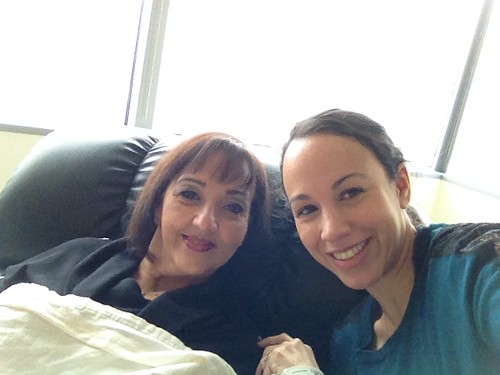Things were okay for a while. She had normal follow-up scans in June 2014.
In January 2015 CT-scans showed that her cancer had returned. She numerous spots and one large tumor where her kidney used to be. She found out on February 16th, and shortly thereafter had MRIs on her pelvis. She had a biopsy of the large tumor on March 4 to confirm that it was kidney cancer and before proceeding with treatment.
On March 11, we met with her oncologist to discuss treatment options. The tumors she has cannot be surgically removed because they are on blood vessels. Surgery would be very dangerous, and probably not effective given the number of tumors. Chemo and radiation typically do not work on kidney cancer. Sometimes if they're desperate enough they will use some form of targeted radiation, but as I experienced with my dad, this largely just resulted in more pain and no improvements.
She agreed to go on a randomized phase II trial studies how well cabozantinib-s-malate (Cabometryx) works compared to sunitinib malate (Sutent) in treating patients with previously untreated kidney cancer that has spread to nearby areas or other parts of the body. We were hoping for the Cabo but she got assigned Sutent. Sunitinib is a protein kinase inhibitor. Protein kinase is a type of chemical messenger (enzyme) that plays a part in the growth of cancer cells. Sunitinib blocks the protein kinase to stop the cancer growing. It can stop the growth of a tumour or shrink it down. Sutent didn't work for my mom. She also had really bad side effects.
In mid-June, Phase II study of axitinib (Inlyta), an FDA approved drug, + Dalantercept, not yet FDA approved/ or placebo. She had really bad side effects from the treatment. Axitinib is a tyrosine kinase inhibitor, which blocks certain proteins, tyrosine kinases, that signal to cancer cells to grow. Axitinib blocks different types of tyrosine kinase and is called a multi kinase inhibitor. It stops cancer cells forming blood vessels, which the cancer needs in order to grow. This is called anti-angiogenesis treatment. It's an "activin receptor-like kinase 1 inhibitor," whatever that means. I'm not sure if she got Dalantercept in the study or not.
In September, they put her on a IV drug combo of temsirolimus (Torisel) and bevacizumab (Avastin). Temsirolimus is an mTOR inhibitor. It blocks the effects of a protein called mTOR, often over active in cancer cells that makes the cells divide and grow. Temsirolimus is also an anti-angiogenesis drug. Bevacizumab is a different kind of anti-angiogenesis treatment that targets a cancer cell protein called vascular endothelial growth factor (VEGF, which helps cancers grow blood vessels).
She had mild side effects compared to her reactions to other drug combos, but you know, still not fun. Her November scan showed no progression and some shrinking of the tumors!
Mom and me at her weekly infusion treatment

No comments:
Post a Comment